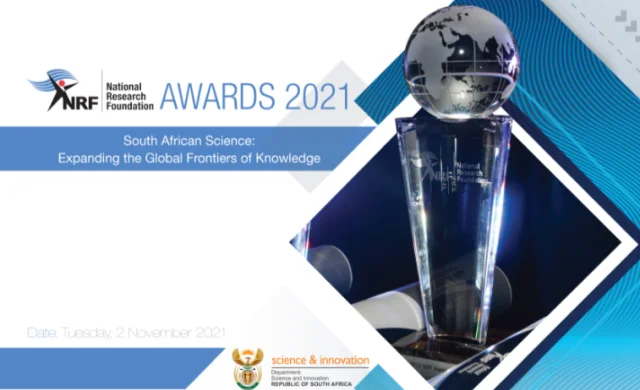
By Sam van Heerden, Masters in Philosophy student
From climate change to the COVID-19 pandemic, the world looks to scientists to pave the way toward a more secure and sustainable future. Last night, the National Research Foundation (NRF) gathered to celebrate South Africa's local research talent at the annual NRF Awards ceremony, where two of our own – Professor Tebello Nyokong and Dr Takudzwa Madzivanzira – were acknowledged.
"[The awardees this evening] represent the prime of South Africa's research excellence," said NRF Board Chairperson, Dr Nompumelelo Obokoh. "Our scientists and healthcare professionals have been our beacon of hope by rising to the occasion, particularly in key areas that have helped mitigate the impact of COVID-19. [..] The work [of our awardees and scientists] not only expands the global frontiers of knowledge but also serves as an inspiration for those who are yet to come."
A renowned chemist and researcher of the Rhodes University Institute for Nanotechnology Innovation, Distinguished Professor Tebello Nyokong was conferred an A-rating research award by the NRF for a second time. The recognition signals that Professor Nyokong has had a considerable impact in her fields of research, which are primarily electrochemistry, photophysics, and nanomaterials. Although technically awarded to her in 2020, this year's ceremony celebrated both 2020 and 2021 awardees due to the disruption of the pandemic. Professor Nykong is also the South African Research Chairs Initiative (SARChI) Research Chair in Medicinal Chemistry and Nanotechnology.
The NRF rating is a formal evaluation of a researcher's publication output and positioning over several years. "An A-rated scientist is a researcher who is unequivocally recognised by their peers as world-leading scholars in their respective fields," explained presenter and communications manager for NRF-iThemba LABS, Dr Gillian Arendse. The NRF awards aim to recognise the achievements and excellence of South African scientists and researchers as they produce and share knowledge, build human capacity, and transform the national science system.
Attending the ceremony virtually, the Minister of Higher Education, Science, and Innovation, Dr Blade Nzimande, detailed a new policy framework for science and technology to be implemented over the next decade. He also praised the successes already won, including the contribution of the South African scientific community to battling the COVID-19 pandemic. "South African researchers rose to the occasion," he said. "They committed their expertise, time, and resources to developing solutions to manage the crisis, monitor its impact, and find ways to fight the disease."
In the presence of both local and global challenges, research can ignite far-reaching impacts in society, far from the laboratories and lecture halls of the university. Dr Obokoh explained that the NRF aims to facilitate research and innovation that can positively affect national development. "[It is about supporting] research and advancing knowledge for the benefit of society," she said.
But change also starts at home. To address historical legacies, investing in black and women researchers is also at the top of the agenda for the NRF. "The NRF is committed to helping create a fully transformed research landscape," Dr Obokoh explained. "The NRF recognises the need to strategically invest in the cohort of [young] researchers [who can help] to transform, renew, and replenish a sustainable science system."
Rhodes University boasts many young talented researchers of its own. PhD graduate from the Department of Ichthyology and Fisheries Science, Dr Takudzwa Madzivanzira, was also awarded a Research Excellence Award for Next Generation Researchers in 2020, conferred at last night's ceremony. This award recognises outstanding research performance for final year doctoral students who are currently funded by the NRF. The award aims to address skills shortages in science, engineering, technology, humanities, and the social sciences. Dr Madzivanzira worked with the South African Institute for Aquatic Biodiversity (SAIAB), focusing on the biology and invasive pathways of crayfish in African countries.
Rhodes University alumna Dr Michelle Lochner, who is now a senior lecturer at the University of the Western Cape, was awarded a P-rating research award. This signifies a young researcher on a steep trajectory of scholarly productivity, identified as highly likely to be a future leader in their field.
Although South African scientists are pushing boundaries and making an impact, there is still much work to be done. The CEO of the NRF, Professor Fulufhelo Nelwamondo, urged researchers to continue their work for the betterment of South African society and beyond. "Science remains the key to a reimagined innovative future," he explained. "Let us continue to do the worthwhile work by advancing knowledge, transforming lives, inspiring the nation, and inspiring the world."
The awards ceremony can be viewed here: https://www.youtube.com/watch?v=mfdAUvx9v1I
